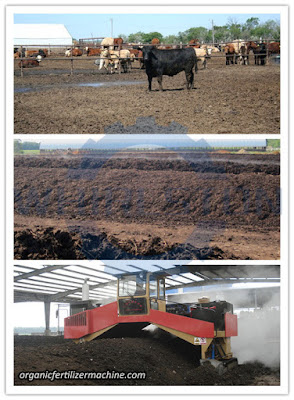Cow Dung: A Composted fertilizer
 Manure is a derived product from waste produced from cattles like cow,
buffalo, goat, and sheep. The use of cattle manure, or cow dung, at
small scale agriculture and garden is a popular & advantageous
practice which the farmers use in many rural areas to make their soil
fertile enough. However, the
plants may get damaged due to the high ammonia levels when the fresh
manure is directly applied. If this raw cow dung is once composted through compost turner machine, it
can provide numerous benefits to the garden and farm plants.
Manure is a derived product from waste produced from cattles like cow,
buffalo, goat, and sheep. The use of cattle manure, or cow dung, at
small scale agriculture and garden is a popular & advantageous
practice which the farmers use in many rural areas to make their soil
fertile enough. However, the
plants may get damaged due to the high ammonia levels when the fresh
manure is directly applied. If this raw cow dung is once composted through compost turner machine, it
can provide numerous benefits to the garden and farm plants.
Cow dung can be described as the waste
product of bovine animal species. These species also include domestic cattle (“cows”), bison (“buffalo”), yak and water buffalo. Cow
dung is the undigested residue of plant matter which has passed through
the animal’s gut and the elementary canal. The resultant faecal matter
produced after digestion is rich in minerals. The color of cow dung
ranges from greenish to blackish, often darkening soon after exposure
to air.
Composition of Cow Dung
The composition of cow dung manure is basically digested grass and
grain. The grass and grain which they eat is not easily digested and
remain up to some extent in their residue. The grass has the high
cellulose content, although there are some species of microorganisms
found in the guts of these animals. They actively work upon the grass
and other substrate material to break it into their simpler compounds.
The part which is not digested here is forwarded to stomach where in
presence digestive juice its gets digested. It has the high roughage
content. Cow dung provides high levels of organic materials and rich in
nutrients. It contains about 3 percent nitrogen, 2 percent phosphorous,
and 1 percent potassium (3-2-1 npk). In addition, one of the other
advantages it is very useful for the farmers to use cow dung manure
because it contains high levels of ammonia which is potentially
dangerous for pathogens. The growth of the pathogens is almost ceased
due to its use. For this reason, it’s usually recommended that it be
aged or composted prior to its use as cow manure fertilizer.
Composting Cow Manure
The processing methodology of cow dung manure is first to collect the
animal residue. Heavy manures like that of cows, is mixed with organic
substances like vegetable waste, garden debris, hay and straw etc. in
addition to the usual organic substances. Small amounts of lime or ash
may also be added to promote the carbon content of the manure. The mixed
cow dung is then subjected to a pit of predefined dimensions and left
for weeks aerobically. Microorganisms or earthworms present in the
manure start eating it and converting it into the manure. The process is
totally aerobic at the surface but in some cases it is seen that there
is there is occurrence of anaerobic environment in the lower levels of
the pit and it generates foul smell. To avoid this problem during
composting of the manure it should be tossed properly at regular
intervals to neglect any possibility of anaerobicity.


Comments
Post a Comment